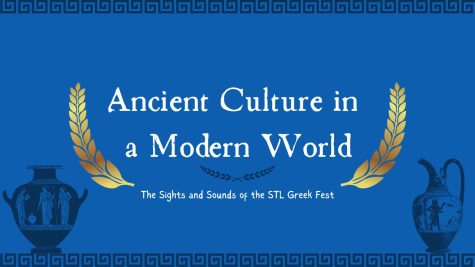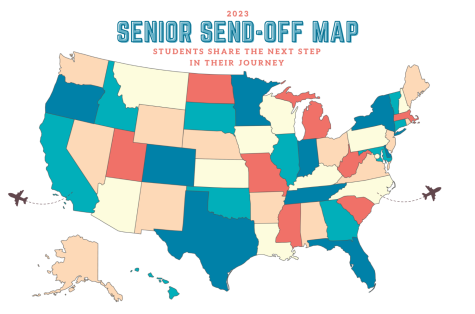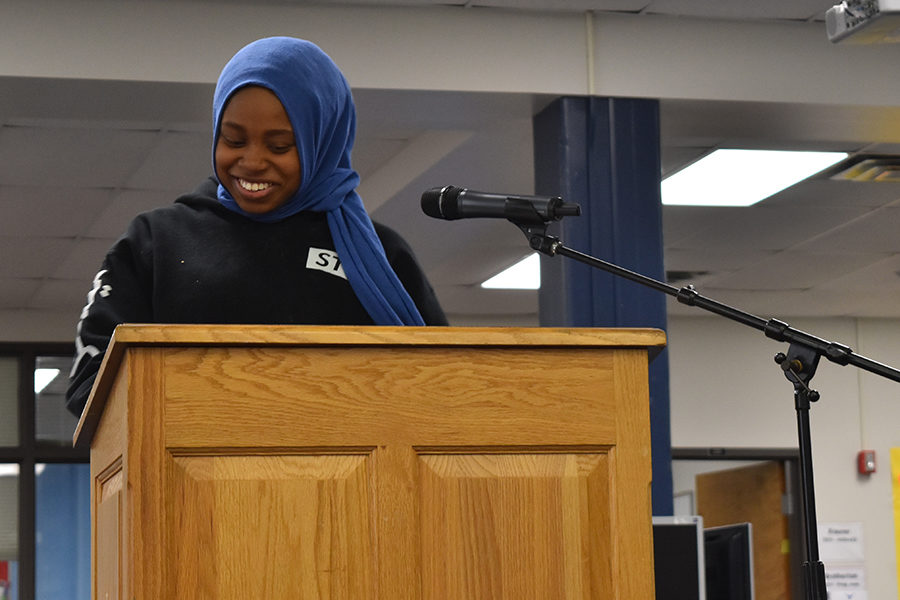African-American Read-In celebrates excellence
Junior Maryam Oyebamiji laughs during her reading. Oyebamiji had been an audience member of the read-in for the last two years, but spontaneously chose to read this year. “Mr. Welch kept egging me to go, he kept staring at me, and I was like, ‘You know, why not,’ and I already had a book in my hands so I went up,” Oyebamiji said.
As librarian Brian Welch stands at the podium on Feb. 22, students laugh between mouthfuls of pizza at his commentary on the Southern accent he is about to use. This was the start of the 15th annual African-American Read-In, and after Welch finished his passage, around 30 students took the podium to earnestly share readings from African-American authors.
“I felt like the last three years I didn’t really do a whole bunch for Black History Month in school, and I wanted to do a little something, even if it was just a little poem I read at the read-in,” senior Taj Ivy said. “Also, it’s good for the younger African-American students to see that they can express themselves in Black History Month, and anytime. I’m trying to be a good role model.”
While most participants read published works, ranging from Supreme Court opinions to poetry, senior ChrisSean Evans chose to write something himself, about being an African-American man and the history of African-Americans before him.
“I’ve written poetry before but it was nothing really serious, and I was like, ‘You know what, I’m not writing the simple things,’ and I just wrote whatever came to mind, then I read it and everyone said ‘Oh, it’s so good,’” Evans said. “I was a little bit nervous [to read it] because I’ve never spoken any of my poetry, so it was a bit weird. I wasn’t scared or anything though, it was fun to do.”
The experience moved audience members and readers alike; readings had recurring themes of female empowerment, a strive for excellence and African-American history.
“It makes me feel like African-American literature is a legit thing because I feel like it hasn’t been recognized enough in the past and especially in the school system,” junior Maryam Oyebamiji said. “When they give a day just for African-American literature and poems it really does feel like it is an actual thing because I know there’s a lot of past history that comes with African-American struggles and the fact that they recognize it is really good.”
With around 100 participants every year, students leave the read-in with an appreciation for African-American literature and advice for their fellow students that did not attend.
“This read-in is something that everyone should try to make it to at least one year, at least once before they get out of high school because it’s a very great experience,” Ivy said. “Even if you don’t read something, listening to the poems that everyone has, however they’re expressing themselves, is a really cool thing, and you can get a lot from it. And if you do get the chance I would encourage people to read.”



![“[The happiest moment of my life was when] when I did my first dance solo for the first time, it was contemporary and to the French song, "Je te laisserai des mots" [by Patrick Watson]. I performed it last season, so March through May, and got 11th overall in one competition for it. [I also] got platinum and high gold at other competitions. I've been competing for six years, but dancing for 13 years. Dance is like therapy to me, I get to express myself, especially with styles like contemporary and hip hop,” - Sam Johnson, 10](https://pwestpathfinder.com/wp-content/uploads/2023/01/DSC_0001-1-475x317.jpg)
![Cutting into a celebratory cookie cake, the secretary of the Indian Club and junior Swati Kumar kicks off the first meeting. Club board members introduced themselves and reviewed what future meetings would look like. “[I am] excited to see how far we could take this club. Indian culture is overlooked many times, so being a part of educating and celebrating it with others [is] so fun,” Kumar said.](https://pwestpathfinder.com/wp-content/uploads/2023/01/IMG_0093-1-1-475x356.jpg)
![Checking the thermometer, sophomore Disa Tiemeier makes sugar glass while experimenting in the kitchen. Tiemeier relied on baking to cope with xyr Functional Neurological Disorder (FND). “I bake or nap to take breaks because pulling myself out of a [situation] is helpful. I've been baking my entire life, and I enjoy anything [culinary] altogether,” Tiemeier said.](https://pwestpathfinder.com/wp-content/uploads/2022/10/Resized_20221102_220742-475x475.jpeg)
![Sophomore Nidhi Pejathya lights candles to welcome guests on Diwali. An urli is a traditional Indian decoration filled with water, flowers and candles that are lit during the holiday. “Diwali is the festival of lights, so we greet the goddess Lakshmi with [them]. In our culture, a huge saying is ‘treat your guests like god,’ so we do the same for them as we would for the goddess,” Pejathya said.](https://pwestpathfinder.com/wp-content/uploads/2022/10/Nidhi-FEAT-475x356.jpg)
![Junior Caitlyn Allendorph carries the shield of her mentor during the Society for Creative Anachronism (SCA) Laurel Award Ceremony. The award is presented to those who have excelled in the arts and sciences category. “This was a huge honor to do this, [my mentor] helped me get my bearings at the SCA. It makes me so happy that I was able to be in this,” Allendorph said.](https://pwestpathfinder.com/wp-content/uploads/2022/09/image_50802177-475x319.jpg)
